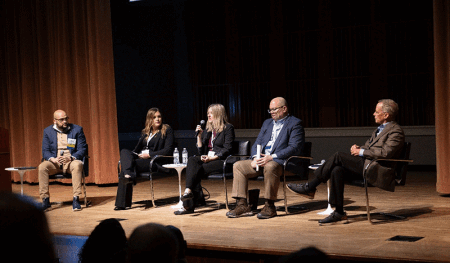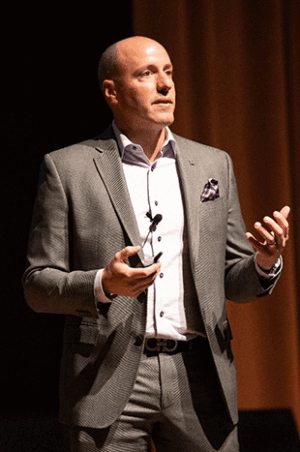In late January, ULI Indiana convened a panel of local real estate experts to unpack Indiana real estate trends for 2023.
The panel was preceded by a presentation of Emerging Trends in Real Estate® United States and Canada 2023 by Lou DeFalco, private real estate equity leader, PwC.
DeFalco shared, in reference to higher interest rates, labor shortages, and other market concerns, “All of these things are presenting this big wall of worry that is certainly reflected in sentiment. But again, there is still long-term optimism for real estate being an attractive sector.”
Following the presentation, a local panel of real estate professionals shared trends across affordable housing, hospitality, office, ESG, talent development and brain drain, and infrastructure in Indiana.
The panel was moderated by Vincent Ash, vice president of real estate development, Indiana Economic Development Corporation and featured insights from Julie Sharp, executive vice president, Merchants Capital; Krista Taggert, deputy general counsel, Endress and Hauser; Larry Gigerich, executive managing director, Ginovus; and Michael Wells, president, REI Investments.

From left to right: Vincent Ash, vice president of real estate development, Indiana Economic Development Corporation; Julie Sharp, executive vice president, Merchants Capital; Krista Taggert, deputy general counsel, Endress and Hauser; Larry Gigerich, executive managing director, Ginovus; and Michael Wells, president, REI Investments, discuss Indiana real estate on stage at the Indiana Historical Society in Indianapolis.
Here are a few key takeaways:
Sharp: “[In 2023] we’ll see some consistency [in inflation] at the pace of interest rates…single family home buying has slowed down. It’s pushed more people into multifamily, or maybe they’ve stayed in multifamily rental housing, which as we mentioned has experienced double digit growth in 2021 and 2022…We’re seeing some evidence of market rate rents slipping a little bit, but not much. And so what that’s created is this affordability crisis… The National Low Income Housing Coalition estimates that 72 percent of Indiana families are rent overburdened, which is the largest in the Midwest, 13th highest in the United States.”
Taggert: “One of the things our company is doing is really starting to invest in workforce development... In our new building, we’re hoping to have an innovation center where STEM teachers can come and bring their classrooms to do field trips, robotics, coding, that type of thing…I think it’s critical to have that educated workforce, particularly in the STEM fields, in order for us as a state to be able to continue to grow with these types of investments.”
Gigerich: “Salesforce [with headquarters in Indianapolis] hired 22,000 people during COVID… I think a lot of those tech firms, some worse than others, certainly have pulled back. That’s going to have an impact [on office]…you’re not only going to see office space used differently, but it’s never going to bounce back like we typically have seen after recessions before.”
Wells: “Business travel is starting to come back. I think what we’re seeing on the business travel side is smaller and midsize businesses. I think those people realize they need to be meeting their customers face to face… Business travel is up to like 71 percent of 2019, which is not bad.”
Although the outlook for development in Indiana is positive, the panel agreed, it’s important to drive confidence for companies and individuals to invest in and relocate to the state.





